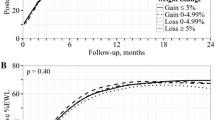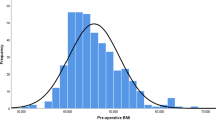Abstract
Background
The primary purpose of this study was to assess weight loss and occurrence of weight regain among patients who underwent Roux-en-Y gastric bypass (RYGB) using categorical analysis.
Methods
Study participants were selected from patients who underwent RYGB from a single institution. Participants (n = 300, mean procedure age = 45.6 ± 9.9) completed surveys for self-reported preoperative weight, current weight, and subsequent weights over postoperative years. Measured weights and confirmed procedure dates were acquired from patient medical records. Mean preoperative weight and BMI were 140.8 kg ± 32.1 and 49.7 ± 9.9, respectively, and mean years since surgery was 6.9 ± 4.9. Study subjects were mostly Caucasian (56.7 %) and female (80.3 %). Participants were stratified a priori into four cohorts based on percent of weight loss at 1 year, <25 % (n = 39), 25–30 % (n = 51), 30–35 % (n = 73), and >35 % (n = 113). General linear model analyses were conducted to assess the effect of year one weight loss on percent weight regain.
Results
The mean weight regain for all patients was 23.4 % of maximum weight loss. Using categorical analysis, mean weight regain in the <25, 25–30, 30–35, and >35 % weight loss cohorts was 29.1, 21.9, 20.9, and 23.8 %, respectively. Excessive weight regain, defined as ≥25 % of total lost weight, occurred in 37 % of patients.
Conclusion
Weight gain is a common complication following RYGB surgery. Despite the percentage of weight loss over the first year, all cohort patient groups regained on average between 21 and 29 % of lost weight. Excessive weight gain was experienced by over one third of patients. Greater initial absolute weight loss leads to more successful long-term weight outcomes.



Similar content being viewed by others
References
Puzziferri N, Nakonezny PA, Livingston EH, et al. Variation of weight loss following gastric bypass and gastric band. Ann Surg. 2008;248(2):233–42.
Benoit SC, Hunter TD, Francis DM, et al. Use of bariatric outcomes longitudinal database (BOLD) to study variability in patient success after bariatric surgery. Obes Surg. 2014;24:936–43.
Courcoulas AP, Christian NJ, Belle SH, Longitudinal Assessment of Bariatric Surgery (LABS) Consortium, et al. Weight change and health outcomes at 3 years after bariatric surgery among individuals with severe obesity. JAMA. 2013;310(22):2416–25.
Christou NV, Look D, MacLean LD. Weight gain after short- and long-limb gastric bypass in patients followed for longer than 10 years. Ann Surg. 2006;244(5):734–40.
Shah M, Simha V, Garg A. Review: long-term impact of bariatric surgery on body weight, comorbidities, and nutritional status. J Clin Endocrinol Metab. 2006;91(11):4223–31.
Sjöström L, Lindroos AK, Peltonen M, et al. Lifestyle, diabetes, and cardiovascular risk factors 10 years after bariatric surgery. N Engl J Med. 2004;351:2683–93.
Karmali S, Brar R, Shi X, et al. Weight recidivism post-bariatric surgery: a systematic review. Obes Surg. 2013;23:1922–33.
Puzziferri N, Rosheck TB, Gallegher R, et al. Long-term follow up after bariatric surgery. A systematic review. JAMA. 2014;312:934–42.
Chang SH, Stoll CRT, Song J, et al. The effectiveness and risks of bariatric surgery. An updated systematic review and meta-analysis, 2003-2012. JAMA Surg. 2014;149:275–87.
Jebb SA, Ahern AL, Olson AD, et al. Caterson ID. Primary care referral to a commercial provider for weight loss treatment versus standard care: a randomized controlled trial. Lancet. 2011;378:1485–92.
Wadden TA, Volger S, Sarwer DB, et al. A two-year randomized trial of obesity treatment in primary care practice. N Engl J Med. 2011;365:1969–79.
Smith SR, Weissman NJ, Anderson CM, et al. Multicenter, placebo-controlled trial of lorcaserin for weight management. N Engl J Med. 2010;363:245–56.
Gadde KM, Ryan DH, Peterson CA, et al. Effects of low-dose, controlled-release, phentermine plus topiramate combination on weight and associated comorbidities in overweight and obese adults (CONQUER): a randomized, placebo-controlled, phase 3 trial. Lancet. 2011;377:1341–52.
Van de Laar AWJM, Acherman YIZ. Weight loss percentile charts of large representative series: a benchmark defining sufficient weight loss challenging current criteria for success of bariatric surgery. Obes Surg. 2014;24:727–34.
Bray GA, Bouchard C, Church TS, et al. Is it time to change the way we report and discuss weight loss? Obesity. 2009;17(4):619–21.
Magro DO, Geloneze B, Delfini R, et al. Long-term weight regain after gastric bypass: a 5-year prospective study. Obes Surg. 2008;18:648–51.
Ritz P, Caiazzo R, Becouarn G, et al. Early prediction of failure to lose weight after obesity surgery. Surg Obes Relat Dis. 2013;9:118–22.
Astrup A, Rossner S. Lessons from obesity management programmes: greater initial weight loss improves long-term maintenance. Obes Rev. 2000;1:17–9.
Barte JCM, ter Bogt NCW, Bogers RP, et al. Maintenance of weight loss after lifestyle interventions for overweight and obesity, a systematic review. Obes Rev. 2010;11:899–906.
Neiberg RH, Wing RR, Bray GA, et al. Patterns of weight change associated with long-term weight change and cardiovascular disease risk factors in the Look AHEAD study. Obesity. 2012;20(10):2048–56.
Unick JL, Hogan PE, Neiberg RH, et al. Evaluation of early weight loss thresholds for identifying nonresponders to an intensive lifestyle intervention. Obesity. 2014;22(7):1608–16.
Wadden TA, Neiberg RH, Wing RR, et al. Four-year weight losses in the Look AHEAD study: factors associated with long-term success. Obesity. 2011;19(10):1987–98.
The Look AHEAD Research Group. Eight-year losses with an intensive lifestyle intervention: the look AHEAD study. Obesity. 2014;22(1):5–13.
Kofman MD, Lent MR, Swencionis C. Maladpative eating patterns, quality of life, and weight outcomes following gastric bypass: results of an internet survey. Obesity. 2010;18(10):1938–43.
Odom J, Zalesin KC, Washington TL, et al. Behavioral predictors of weight regain after bariatric surgery. Obes Surg. 2010;20:349–56.
Livhits M, Mercado C, Yermilov I, et al. Behavioral factors associated with successful weight loss after gastric bypass. Am Surg. 2010;76(10):1139–42.
Colles SL, Dixon JB, O’Brien PE. Grazing and loss of control related to eating: two high risk factors following bariatric surgery. Obesity. 2008;16(3):615–22.
Acknowledgments
Northwestern Medicine
Enterprise Data Warehouse (EDW)
Center for Lifestyle Medicine
Department of Surgery
Department of Medical Social Sciences
Chris Mitchell, EDW
Conflict of Interest
The authors declare that they have no conflict of interest.
Disclosure Statement
All procedures performed in studies involving human participants were in accordance with the ethical standards of the institutional research committee and with the 1964 Helsinki declaration and its later amendments or comparable ethical standards.
Author information
Authors and Affiliations
Corresponding author
Rights and permissions
About this article
Cite this article
Cooper, T.C., Simmons, E.B., Webb, K. et al. Trends in Weight Regain Following Roux-en-Y Gastric Bypass (RYGB) Bariatric Surgery. OBES SURG 25, 1474–1481 (2015). https://doi.org/10.1007/s11695-014-1560-z
Published:
Issue Date:
DOI: https://doi.org/10.1007/s11695-014-1560-z




